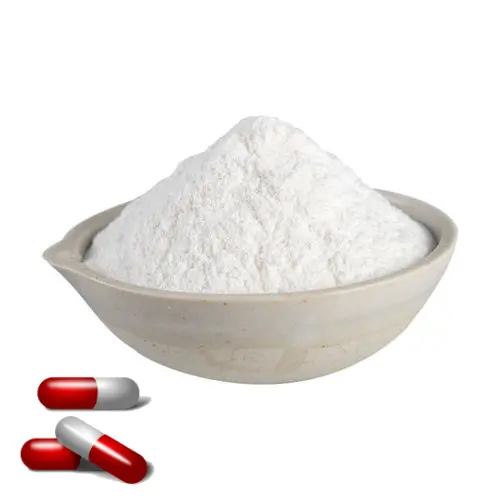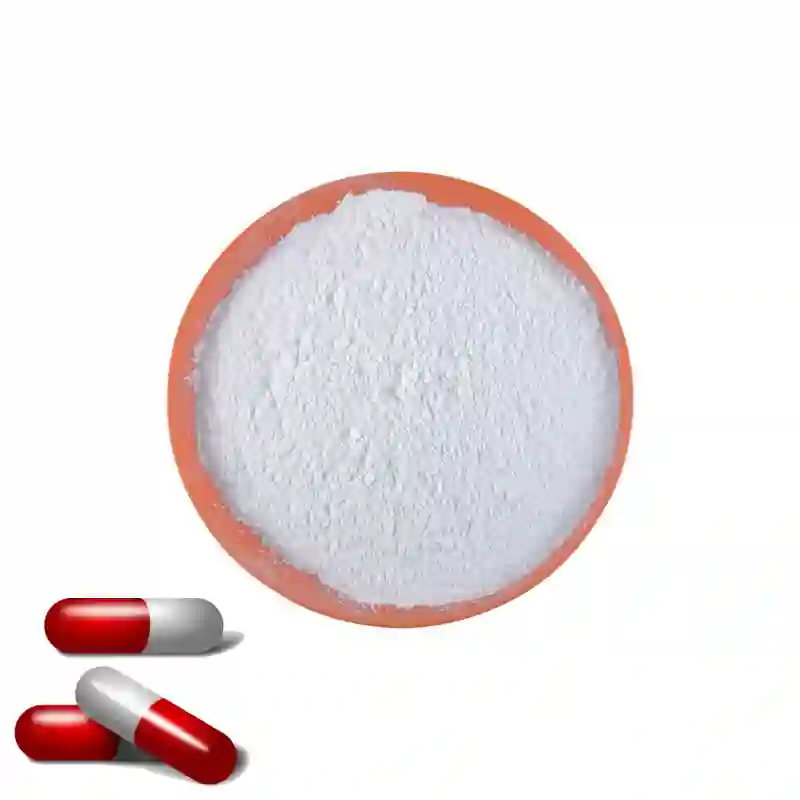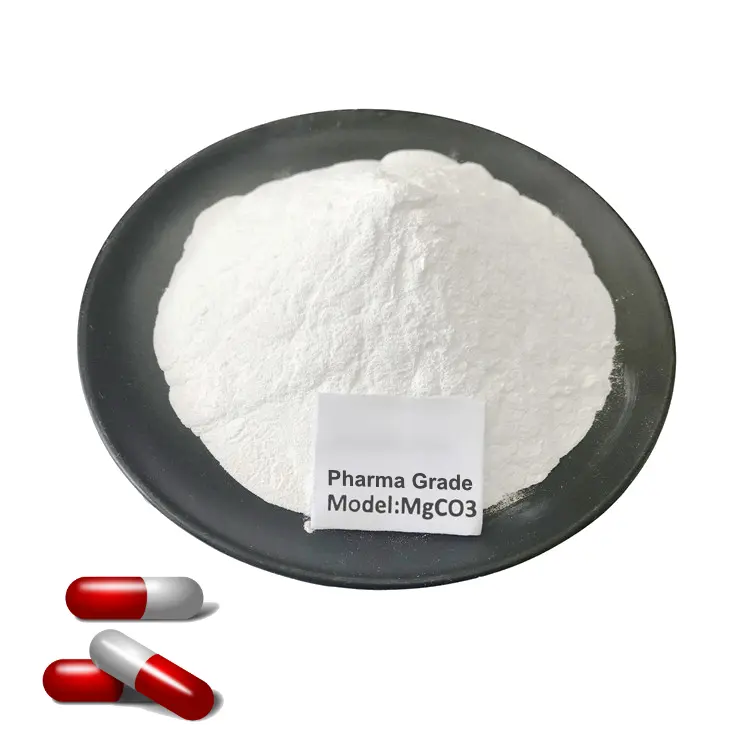Magnesia zur Herstellung pharmazeutischer Zusatzstoffe
Hochreine ätzende kalzinierte Magnesia (oder kalziniertes Magnesiumoxid) wird zur Herstellung pharmazeutischer Zusatzstoffe wie Magnesiumacetat, Magnesiumstearat und basischem Magnesiumcarbonat verwendet.
Während sich die Spezifikationen für MgO in pharmazeutischer Qualität auf synthetische Qualitäten mit sehr hoher Reinheit beziehen, können die hochreinen natürlichen Qualitäten von Grecian Magnesite mit hohem Mg-Gehalt, wenig Eisen und Spurenelementen, wenig säureunlöslichen Bestandteilen und sorgfältig angepasster Reaktivität als Zwischenprodukte für die Herstellung von Acetaten, Stearaten und basischen Magnesiumcarbonaten oder aufgewerteten MgO-Qualitäten von unschätzbarem Wert sein.

Als Hersteller von Magnesiumoxid können wir unsere Produkte sogar individuell an Ihre speziellen Anforderungen anpassen. Wenden Sie sich einfach an unsere Vertriebsingenieure und F&E-Teams, die Sie durch unser Produktportfolio führen und die Lösung finden, die am besten zu Ihnen passt.
Arten von medizinischen Magnesiumverbindungen in der Pharmaindustrie
Eine besteht darin, Magnesiumverbindungen als Hauptbestandteil zu verwenden und sie direkt als Arzneimittel zur Neutralisierung der Magensäure einzusetzen, wie etwa medizinisches Magnesiumoxid und Magnesiumtrisilikat;
Die zweite Möglichkeit besteht darin, Magnesiumverbindungen als Hilfsstoffe in der Pharmaindustrie einzusetzen.
Die Herstellung der ersteren richtet sich grundsätzlich nach den Anforderungen der Pharmaindustrie. Die Produktqualität entspricht nicht nur den Anforderungen des Arzneibuchs, sondern es werden auch Maßnahmen wie vollständige Versiegelung und Desinfektion in den Raffinations-, Verpackungs- und Verpackungsprozessen im Produktionsprozess ergriffen; es kann angemessen gelockert werden, aber es muss eine saubere Produktion erreicht werden. Magnesiumoxid für medizinische Zwecke ist ein Feinchemikalienprodukt mit geringer Tonnage, aber hohem Wert.
Arten von medizinischer Magnesia
Es gibt zwei Arten von medizinischer Magnesia, schwere und leichte, und allgemeine medizinische Magnesia bezieht sich auf schwere Magnesia. Medizinisches Magnesiumoxid (Magnesiumoxid, medizinisch), Molekülformel Mg0, dieses Produkt ist ein weißes Pulver; geruchlos, geschmacklos; fast unlöslich in Wasser, unlöslich in Ethanol; löslich in verdünnter Säure, kann langsam Kohlendioxid aus der Luft absorbieren, ein Teil erzeugt basisches Magnesiumcarbonat.
Magnesiumoxid wird in der Medizin hauptsächlich in der Pharmaindustrie als Medikament zur Neutralisierung von Magensäure verwendet. Die Wirkung der Neutralisierung von Magensäure ist stark, langsam und langanhaltend und erzeugt kein Kohlendioxid. Nach der Neutralisierung entsteht Magnesiumchlorid, das zu Abmagerung führen kann. Daher ist es für Patienten mit Magen- und Zwölffingerdarmgeschwüren geeignet, die von Verstopfung und Übersäuerung begleitet werden. Darüber hinaus kann es auch bei der Herstellung von Keramik, Emaille, Glas, Farbstoffen, Phenolkunststoffen und anderen Industrien verwendet werden.
Dieses Arzneimittel ist ein Mineralstoffpräparat, das zur Vorbeugung und Behandlung eines Magnesiummangels im Blut verwendet wird.
Einige Marken werden auch zur Behandlung von Symptomen von zu viel Magensäure wie Magenverstimmung, Sodbrennen und saurer Verdauungsstörung verwendet. Magnesium ist sehr wichtig für die normale Funktion von Zellen, Nerven, Muskeln, Knochen und dem Herzen.
Normalerweise sorgt eine ausgewogene Ernährung für einen normalen Magnesiumspiegel im Blut. In bestimmten Situationen verliert Ihr Körper jedoch schneller Magnesium, als Sie es über die Ernährung ersetzen können. Zu diesen Situationen gehören die Behandlung mit Diuretika (z. B. Furosemid oder Hydrochlorothiazid), eine schlechte Ernährung, Alkoholismus oder andere Erkrankungen (z. B. schwerer Durchfall/Erbrechen, Magen-/Darm-Absorptionsstörungen, schlecht eingestellter Diabetes).
Wir beginnen erst langsam, die Physiologie und Chemie des Magnesiums im Hinblick auf seine vielfältigen Funktionen vollständig zu verstehen.
Es ist an mehreren hundert enzymatischen Reaktionen im Körper beteiligt, ist lebenswichtiger Bestandteil von Knochen und Zähnen und spielt eine wichtige Rolle für die Nervenleitung im zentralen Nervensystem. Obwohl das Mengenelement Magnesium schon lange Gegenstand der Forschung ist, werden in seinem Wirkungsspektrum immer wieder neue Bereiche entdeckt.
Dazu gehören beispielsweise seine Rolle bei der Behandlung von Depressionen oder seine lange unterschätzte Bedeutung für eine gute Knochengesundheit im Alter.
Eine ausreichend magnesiumreiche Ernährung ist daher gerade im Alter äußerst wichtig. Als Hersteller von Magnesiumsalzen können wir einen wichtigen Beitrag zur Vorbeugung von Magnesiummangel leisten. Wir bieten Magnesium in verschiedenen Verbindungen für die unterschiedlichsten Anwendungsgebiete, sowohl als Zusatzstoff in Lebensmitteln als auch als Zutat in Nahrungsergänzungsmitteln.
Im medizinischen Bereich werden unsere Magnesiumsalze in Infusionslösungen, als Antazida oder Abführmittel eingesetzt. Bei der Herstellung pharmazeutischer Produkte, insbesondere Tabletten, werden Magnesiumsalze als Trenn- und Filmbildner sowie Träger verwendet. Als Hersteller zahlreicher Pharmaqualitäten produzieren wir Magnesiumsalze auch nach Kundenwunsch.
In der Kosmetik werden Magnesiumsalze beispielsweise häufig als Hilfsstoffe eingesetzt und fungieren als Füllstoff oder zur Regulierung der Viskosität.
Bei unserer Produktion von Magnesiumsalzen für industrielle Anwendungen können wir diverse physikalische Parameter wie Schüttdichte oder Partikelgröße variieren. So können Magnesiumcarboxylate beispielsweise zur Modifizierung der antistatischen Eigenschaften von Polyesterfolien, zur Veränderung der Kunststoffhaftung in Glas-Kunststoff-Verbunden oder als Trägerstoffe für Flüssigkeiten oder Trennmittel in Feststoffen eingesetzt werden.



